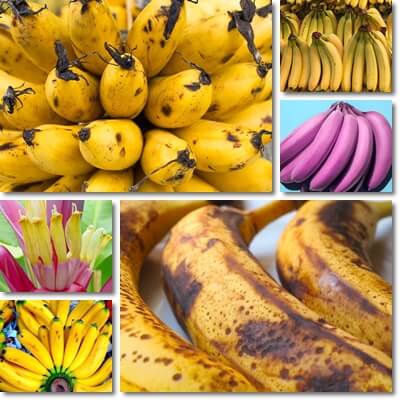Bananas are healthy fruit, nutritious and full of benefits for health. Even so, they are an underrated fruit: while a lot of people people eat bananas all the time, every day even, not enough people realize just how good bananas are for health. Bananas are a good source of potassium, vitamin B6 and manganese, they satiate and fill you up, and don’t cause belly fat or weight gain, despite rumors. Here are the 10 best reasons to eat more bananas.
(1) Bananas are readily available
Bananas are in season all year round and cultivated extensively around the world which makes them readily available at all times. Considering they are not restricted by season, or other factors, and in constant, plentiful supply at all times during the year, why not see this as an advantage and eat more bananas?

(2) Bananas are affordable
When it comes to choosing what foods to buy to eat, affordability plays an important part and can pretty much determine whether we’re going to buy one food over another. Fruits such as bananas are some of the cheapest food options there are. Often times, they’re cheaper than tomatoes and apples, and definitely more accessible than mango, avocado, bell peppers or plums which enjoy similar availability. And the fact that they’re tasty, satiating, and nutritious should encourage us to eat them more often.
(3) Bananas are a clean food
One of the biggest issues with food is cleanliness. Clean food is extremely hard to come by, unless you’re either growing it yourself, or pay handsomely to buy it from others that are and doing so the right way. Both independent and official state investigations have revealed time and time again that fruits and vegetables contain high levels of pesticides, above regulated amounts, and even pesticides that are prohibited for use on food, with proven dangers for human health and the environment.
Some of the most contaminated foods we commonly eat include strawberries, tomatoes, bell peppers, but also spinach, apples, grapes, cherries and potatoes. Bananas rarely make the list, and even if they do, here’s the catch: bananas have a naturally very thick peel that protects the fruit pulp inside from contamination with pesticides, insecticides, toxins or heavy metals. You don’t even need to buy bananas from organic agriculture because the naturally thick peel traps contaminants before they reach the fruit.
(4) Bananas are healthy at all ripening stages
It should come as no surprise that bananas are good for you, irrespective of their ripening stage. It’s important to acknowledge the benefits that come with the different ripening stages of the fruit. Perfectly ripe bananas have reached their full nutritional potential and provide optimal nutrition. Overripe bananas are easier on the stomach, and also provide quick energy to use. Underripe bananas can be eaten raw or cooked, and have less of a glycemic impact.
Of course, there are also side effects to eating bananas at various ripening stages.

(5) Bananas combat tiredness and fatigue
Did you know that bananas are the solution for tiredness and fatigue? For one, bananas are a source of natural sugars that provide quick energy for the body to use. If you have low blood sugar and experiencing associated side effects such as muscle weakness, generalized weakness, fatigue or fainting, then eating a banana should help restore your energy levels in a matter of minutes. One small banana at 100 g provides around 12 g of sugars.
Bananas are also a good source of vitamin B6 and provide good amounts of vitamins B2, B5 and B9 to boost energy metabolism, as well as iron for vitality. They also satiate, without providing too many calories (only 89 kilocalories per 100 g).
(6) Bananas boost fertility
Bananas are good for fertility. How so? For one, bananas provide over 10% of the daily recommended intake of manganese for an average adult in just 100 g of fruit. Manganese naturally maintains and boosts fertility in men, but also women. Manganese deficiency has been correlated with reduced fertility and infertility, as well as birth defects.
According to research, male reproductive cells are ‘critically dependent on Manganese for motility.’ It has been postulated that the decrease in male fertility can be explained, at least in part, by manganese deficiency in the diet (source).
In women, manganese from bananas helps with ovulation. Bananas are also a good source of vitamin C at 10% of daily requirements per 100 g. Vitamin C supports progesterone production for optimal fertility in women.
(7) Bananas are good for gums and teeth
Sugar content aside, because you do brush your teeth, and bananas are definitely better than processed candy for your teeth. More exactly, bananas are a good source of vitamin C which has been scientifically proven to lower levels of inflammation markers in the body such as C-reactive protein and interleukin-6 (source), which may hold benefits for inflammatory gum disease.
Vitamin C also contributes to growing, regenerating and maintain healthy connective tissue, helping gums stay attached tightly to teeth which helps prevent gums disease. Vitamin C deficiency is known to cause tooth loss, and low levels of the vitamin have been observed to cause bleeding gums. Getting enough vitamin C in your diet can help reduce gum bleeding (source) and preserve and advance gum and teeth health.
(8) You can eat bananas with diabetes
Fact: diabetics can eat bananas. Bananas are known to have an average glycemic index score ranging from 62 to over 70 which makes them a moderate to high glycemic fruit. Bananas glycemic load isn’t that much better: moderate, with a glycemic load score ranging from 11 to 14. Moderate and high glycemic foods are not very good for diabetics because they tend to raise blood sugar levels quickly. See my glycemic index fruits list.
However, diabetics can eat bananas and enjoy benefits for their condition as a result. The trick is to eat bananas in small amounts, one serving a day, and pair them with a source of protein or fat such as a piece of cheese or some nuts or seeds to reduce their effects on blood sugar.
Bananas are good for diabetics because they provide quick energy and help prevent hypoglycemia and the overeating that arises in the attempt to compensate for the low blood sugar levels. They have a moderate calorie content and don’t cause weight gain – in fact, you can even lose weight while eating bananas. More important, bananas contain resistant starches, pectin and magnesium which help stabilize blood sugar and even lower blood sugar levels and reduce insulin resistance (source).
(9) Bananas are good for high blood pressure
While there are many foods that are even better for high blood pressure, bananas are good too. One small banana, which is a little over 100 g, provides 10% of the daily recommended intake of potassium for an average adult, and the same amount of magnesium. Just as important, bananas are sodium-free.
Both magnesium and potassium have proven anti-hypertensive benefits and actively lower blood pressure numbers. If you are looking for the best foods to eat for high blood pressure, then consider a smoothie made from one or two small bananas with a large glass of low-fat dairy milk to boost your potassium and magnesium levels and cardiovascular health. Find out how much potassium in milk.
(10) Bananas combat anemia
Did you know that bananas are good for anemia? A small banana at 100 g provides around 30% of the entire recommended daily intake (RDI) of vitamin B6. Vitamin B6 helps produce hemoglobin and boosts the capacity of hemoglobin to absorb oxygen, actively helping combat anemia and associated symptoms such as fatigue and muscle weakness. Bananas are also a good source of vitamin C (10% RDI per 100 g) and vitamin C boosts absorption of iron with benefits for anemia.
